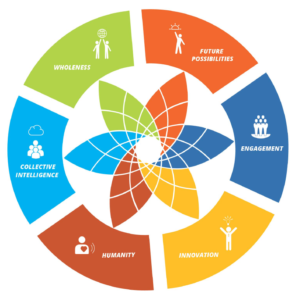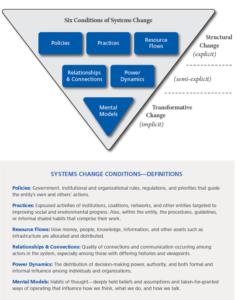Courageous Leadership from the Heart
Blog 6 of 6: Collective Action

Capitalism and neoliberalism have not worked for the majority of people and the planet, as explained in my first blog of this series. I see changing mindsets towards the softening of neoliberalism and to promote the UN Sustainable Development Goals as extremely important.
In a Guardian newspaper article from 30th May 2019 (https://www.theguardian.com/business/2019/may/30/neoliberalism-must-be-pronouced-dead-and-buried-where-next ) Joseph Stiglitz, a renowned economist, states “slow economic growth, rising inequality, financial instability and environmental degradation are problems born of the market, and thus cannot and will not be overcome by the market on its own.” He further states that the balance between markets, the state and civil society needs to be restored. Governments have a duty to limit and shape markets through environmental, health, occupational safety and other types of regulation. It is also the government’s job to do what the market cannot or will not do, such as actively investing in basic research, technology, education and the health of its constituents.
I wholeheartedly agree.
At the global level, the United Nations have developed the Sustainable Development Goals (UN SDG’s) which are the blueprint to achieve a better and more sustainable future for all. They address the global challenges we face, including those related to poverty, inequality, climate, environmental degradation, prosperity, and peace and justice.
These Goals trickle down through governments, organisations, civil society and individuals. For example, UNSDG 8 Decent Work and Economic Growth. The gig economy with zero-hours contracts often paying below a living wage cannot be considered decent work and as such does not comply with this UN goal.
Complex problems, for example child labour and slavery, cannot be solved by one actor alone, be that government, business, unions, or civil society. They require all stakeholders to be involved collectively.
To address this, the United Nations Sustainable Development Goal number 17 (UN SDG 17) is on partnerships. The UN website says “a successful sustainable development agenda requires partnerships between governments, the private sector and civil society. These inclusive partnerships built upon principles and values, a shared vision, and shared goals that place people and the planet at the centre, are needed at the global, regional, national and local level”. This is collective action.
| Collective action is the coordinated or self-organised process of collaboration among different actors to achieve a common objective.
Co-creation of reality happens all the time – consciously or unconsciously. The term is often referred to when people work innovatively on a jointly agreed deliverable while attending to the quality of relationships through respect, trust and genuine listening. Collective Leadership for Sustainability is the capacity of a group of leaders to deliver their contribution to a joint purpose collaboratively, while putting high priority on a balance between the needs of people, profit, and planet. At the core of Collective Leadership is the human capacity to make a difference by building performance and innovation on dialogue and diversity. It invigorates networks of knowledge sharing, collective action, and mutual support. From The Collective Leadership Institute publication “Shifting the way we co-create”. |
The quality of a partnership comes from the quality of collaboration, but do we do it well? Often, we talk too much or too little, promote our own opinions too much, mistrust the others, and do not really listen. Our manner of collaboration often prevents us achieving good results and impact.
Think of a past collaboration you were involved in that was a success – what worked? A common goal, trust, respect, listening, feeling equal and involved, and sharing views are probably on your list. In cross-organisational collaboration these are often not prioritised.
To help with the content and frame of minds when involved in stakeholder collaboration and dialogue the Collective Leadership Institute, who provide consultancy and training on this, has developed an approach that really speaks to me called the Collective Leadership Compass. It is a checklist, process and mindset rolled in to one.

No matter what project or collaboration event you are involved in this compass can be used. It guides your thinking and keeps you looking at the big picture and the detail. The terms used are not intuitive but are well explained on the Institutes website. I recommend wholeheartedly further investigation of this compass.
My son and I used the compass recently to determine how he should quote for some business. We went through each “dimension” (the coloured blocks on the graphic) of the compass to help understand the bigger picture, where to focus, and identify his approach. We were both very pleased with the result. His potential client liked his analysis too.
FSG is an organisation that concentrates on partnerships, collective impact and social change. Their publication “The water of systems change”, which easily applies to all types of organisation discusses six conditions for social change.

Organisations overly concentrate on policies, practices and resources. Yet the publication makes it clear that transforming the relationships between people who make up the system and people’s mental models (mindsets) are the more important drivers of collaboration and change. The change is unlikely to be effective without these drivers.
Donella Meadows, a pioneer leader and writer on systems thinking, says the top two effective influencers to a shift in the way a system or organisation operates, is mindset and transcending mindsets, or being extremely flexible and unattached to a mindset.
My previous boss agreed, philosophically, that when people take care of themselves, they feel better, and work better. He spoke about putting our health and family first and agreed that collective action was the right way forward.
But deep down, he believed that working independently, harder and longer is what made him successful and is honestly what it takes for the organisation to succeed. The disconnect is in mindset, the often-unconscious beliefs and assumptions that leaders evolve based on the corporate cultures they grew up and succeeded in. It was rather difficult for the team to cope with the difference between the boss’s words and action.
To fulfil the UN SDG’s will require cross organisational partnerships at national, regional and local level. Having the right quality of mind (mindset) will aid the efficiency of collaboration to reach common agreement on what the parties wish to achieve, who does what, how success will be measured, and how the whole system will be organised. Whilst also building performance and innovation through dialogue and diversity and invigorating networks of knowledge sharing, collective action, and mutual support
I may have been a bit “over-the-top” with pushing the importance of mindset but a paradigm shift in our individual and organisational thinking and ways of being is, I believe, required. The quality of our inner being, our inner guidance, overcoming our fears and limiting beliefs to be our natural innate selves is the foundation to us becoming the best vibrant versions of ourselves. We then take our new way of being into our relationships with family, friends, our organisations, and cross-organisational collaboration.
To summarise my blog series on Courageous Leadership from the heart:
Our programming for the way individuals and organisations work has resulted in a world that is out of balance. We all need to look at the world with new eyes and new ways.
Capitalism, neoliberalism, organisational culture, and fear-based authoritarian leadership has led to environmental degradation, inequality, poverty, and individual disconnection leading to mental illness, stress, nervous breakdowns, depression, and obesity. A better way for individuals and organisations to be is:
- People embodying the inside-out understanding of life and inner guidance where we take more responsibility for how we show up in life and strive to be the best version of ourselves through living more conscious lives. This is understanding our core identity and values, improving physical activity, rest, sleep, and nutrition, better self-awareness, and having an open mind, open heart and open will.
- Organisations having purpose and simplicity that engages and energises employees and other stakeholders combined with simplified strategic planning, budgets, governance and culture – A comprehensive overhaul of “the way we do things around here”, promoting employee engagement, responsibility, relationship building, and quality processes from the bottom to the top of every organisation and wider system.
- Organisational support for the whole person, using courage-based leadership, recognising what’s going on inside of your people, teaching and guiding their mindsets, and bringing about that mindset at work. Raising consciousness in the workplace is everyone’s responsibility.
- Embracing self-management to enhance communication and relationships leading to improved collaboration and collective intelligence, clarity, creativity and desire to take responsibility to act together. To build a sense of community, or belonging, through the logic of living systems where coherently interconnecting parts are aligned with all the other parts, acting as an authentic whole.
- Collective Action. That whatever action that takes place is taken collectively – to make a difference by having an inside-out understanding of life, an appropriate mindset, and to build performance and innovation through dialogue and diversity. Invigorating networks of knowledge sharing, collective action, and mutual support. This way, we may even achieve the UN Sustainable Development Goals (SDG’s).
Together we can co-create a better world.
Intandem’s offer on Collective Action
We are Collective Leadership experts and offer consultancy and workshops on the Collective Leadership Compass and stakeholder dialogue, improving collaboration through working on participant mindsets to co-create a better world.
Courageous and Conscious Leadership from the heart:
Intandem and our network of consultants can accompany you in finding clarity and quality of mind entailing individual Conscious Lives, organisational purpose and simplicity, support for the whole person, embracing self-management and collective leadership for action.
If you would like to discuss your organisation’s way forward contact chrisburton@intandem.ch
